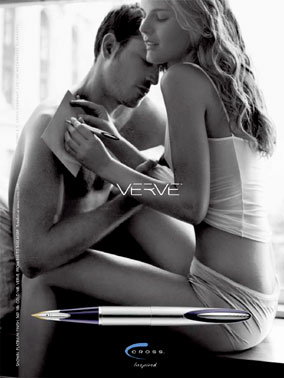Ad Age's Bob Garfield skewers this use of sex to sell pens and the idiots that would actually buy one saying, "Some pitiful wretch will pay up to $450 to buy one. You know, the kind of hotshot who already owns the Patek Philippe watch and the Hermes neckties and the Dolce & Gabana sunglasses and the Lincoln Navigator, who pays lip service to "excellence" and "quality" but who gets no functional benefit in exchange for the obscene price premium."
He then, eloquently, brings us back down to earth, "Face it: a $1.49 Rollerball performs as well as any "fine writing instrument" on the market."
On the actual ad campaign, Garfield continues his attack, "Three ads from Carmichael Lynch, Minneapolis, apparently at a loss for anything else to say about a luxury pen, have focused instead of near-naked hotties about to do the dirty, or just finishing, and who can blame them, because they are both SOOOOOO HOT!!!!!!!!"
So, according to Garfield, sex really doesn't sell all the time. Especially for a product that has, forever, been positioned as the premium in stuffiness. He offers this final advice to A.T. Cross and Carmichael Lynch, "The way to give a product sex appeal is not necessarily to present literal images of sex in progress. Because, if it did, the Joe Lieberman campaign would suddenly get very interesting."
Just like the movie business, in the ad business there are miles and miles of footage that never see the light of the television screen in the form of a commercial. Whether it's due to a shift in strategy which renders a commercial off target or the commercial itself, upon initial viewing, is to racy for the client's taste, there's a lot of un-used TV commercials looking for clients.
Kevin Schaff has turned that pile of un-used commercials into a business called Thought Equity. Schaff buys un-used or old completed commercials from advertisers, wipes any reference to brand, and resells them to other advertisers at greatly reduced prices. This business model has allowed many smaller advertisers to "produce" commercials that were previously prohibitively expensive.
Schaff bought a TV ad from the Atlanta Ballet that showed two guys Kung Fu fighting which the Ballet found too racy for use and resold it to WyoTech, an auto repair school.
Kung Fu opens with two guys slouched in front of the TV. A commercial comes on and they're up and doing their own Jackie Chan riff, in slow motion, complete with sound effects. It ends when one guy leaps over the other, lands on the coffee table, which crashes to the floor.
"Too much free time?" says the voice over. "Go see the ballet."
The new version: "Everyone has skills. Some earn money. Enroll at WyoTech."
The cable sales industry has, after years of producing crappy $500 commercials, jumped on this and become a big customer of Thought Equity.
"To have the ability to go in and from an initial meeting with clients, talk concept and show something that may fit them is an awesome tool to have," said Comcast salesman Dave McGrath. "The basic guts of the ad stays as is, and we go ahead and tag it and put in licensed music beds, and we're off to the races."
It all sounds well and good until we start seeing the same ad pop up over and over but with different company names on it. All in all, it's an admirable approach in that it allows smaller advertisers to avoid the obscenely high production costs that go along with producing a quality television spot.
Thanks to Adrants reader Ethan for pointing to this story.
UPDATE: Adrants reader Klipp Knockee clarifies writing, "The idea is not so new and Thought Equity actually purchased a web based company called Admine.com that acquired the majority of the content. Admine crashed and burned in the dotcom shake up and Thought Equity came in and bought the assets from the investors. There are several players in this syndication arena including a company called ProAd Group that actually sets up franchise type advertising agencies and reuses creative in different DMAs."

Pump Me, Hear Me
The next time you pump gas, there might now be a reason to hold the nozzle yourself rather than stuffing your wallet or gas cap under it to keep the pump running. That is, if you like listening to advertising. DirectCast Network, a Midland Michigan company, has completed a trial of a new, radio network-based, gas pump entertainment/ad delivery system which presents two minute audio segments, with 4 15-20 second commercial breaks, right from the pump to the consumer's ears. Trials have been held in Detroit, Lansing. West Palm Beach and Dallas. Launch is scheduled for Spring in New York, Los Angeles, Chicago, Philadelphia and San Francisco.
Ads can be placed either network-wide or on a station by station basis for about $400 per ad, per station, per month at four nozzles per station. Charter advertisers included Mercedes, Nestle's Dairy Queen, Budget Tire, Pepsi, Burger King and U.S. Army.
In this MediaLife article, A.J. Livsey, following an article telling ad sales reps how to behave, turns the tables and offers advice to media planners on how they should act. Industry bitching at its finest.
Nokia, reviewing agencies for the creative portion of its $40 million account, is expected to open a review for its media assignment as well, said people familiar with the matter

She's Not That Hot
Don't get too excited about the visual here because it's really just an awful commercial for Dolce & Gabbana Eyewear tricking us into believing the remarkable, image enhancing qualities of their magical glasses. In this particular case, I'd think you'd want to know what you were looking at before you got too excited about it.
Other spots this week from AD Age's TV Spots of the Week include the first of Pepsi's new "It's the Cola" campaign, the Britney Madonna video that includes a Mazda RX8 ad, another installment of the now classic Old Navy spots, an ad from Jack in the Box reveals secrets, Fallon Healthcare wants your health plan to be as simple as your kid fixing your computer, an a weepy spot from ATT Wireless that gets Mom to her recital even though she's still on he bus.
Ad Age takes an in-depth look at the idiotic choice of Celine Dion as spokeswoman for Chrysler and the $14 million they wasted on the effort.




